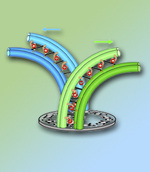University wins $1 million Keck Foundation Grant to investigate active matter
Researchers exploit biology to make advances in soft matter physics

Model indicating how microtubles (blue and green), molecular motors (red) and cross-links (black) generate motion
Brandeis University announced today a $1 million, three-year award from the W.M. Keck Foundation to help support experimental research into a new category of materials known as active matter. The project seeks to elucidate the behavior of active matter at length scales ranging from the microscopic to the macroscopic.
Unlike inert materials such as steel or plastic, active matter can move on its own, displaying properties previously observed only in living materials such as muscles and cells. The project will leverage the university’s pioneering, interdisciplinary approach to research at the intersection of biology and physics. Last year, Brandeis joined an elite group of universities when it won a highly-competitive $7.8 million grant from the National Science Foundation to begin interdisciplinary research on active matter.
“Brandeis has been at the forefront of recent advances in materials science and biology, both in studying the properties of materials occurring in biological systems, and in understanding the role of material properties in the structure and function of cells and cellular components,” said principal investigator Seth Fraden, an expert on colloidal liquid crystals and microfluidics.
Many biological systems display self-organized and distinctive dynamic states at the macroscale—think flocking birds, schooling fish, or swarming bacteria. Similarly, at the mesoscale, cellular motility, and at the microscale or sub-cellular level, cytoskeletal reorganization, represent distinctive dynamic states. All these systems are examples of active matter: they consume energy to generate movement, or stress, in space or time.
“In this project, we will exploit biology in order to make advances in active matter, which has become a frontier field in soft matter physics,” said physicist Zvonimir Dogic, who uses optical microscopy to study self-assembly of biopolymers. “In return, our understanding of non-equilibrium phenomena and active materials will shed new light on a number of important biological structures that are not under direct genetic control, such as flagella beating.”
Along with Dogic and Fraden, the research team includes biologist Daniela Nicastro, a leading authority on high-resolution electron tomography. The project uses two complimentary approaches towards studies of active matter. In a “top-down” approach the researchers will systematically deconstruct fully functioning biological organelles to determine the minimal set of components required for active behavior. In a complimentary “bottom-up” approach they will put well-defined isolated components together in a predefined structure and study how active behavior emerges from spontaneous interactions of the constituent molecules.
Historically, basic research on liquids, colloids, polymers and other soft materials has had spectacular consequences for technology, with liquid crystal displays being the prime example, said Fraden. “We believe that this research has great potential for technological development.”
About Brandeis University
Characterized by academic excellence since its founding in 1948, Brandeis is one of the country’s youngest private research universities and the only nonsectarian Jewish-sponsored college or university in the nation. Named for late U.S. Supreme Court Justice Louis D. Brandeis, Brandeis combines the faculty and resources of a world-class research institution with the intimacy and personal attention of a small liberal arts college.
About the W.M. Keck Foundation
Based in Los Angeles, the W. M. Keck Foundation was established in 1954 by the late W. M. Keck, founder of the Superior Oil Company. The Foundation’s grant making is focused primarily on pioneering efforts in the areas of medical research, science and engineering. The Foundation also maintains a program to support undergraduate science and humanities education and a Southern California Grant Program that provides support in the areas of health care, civic and community services, education and the arts, with a special emphasis on children.





